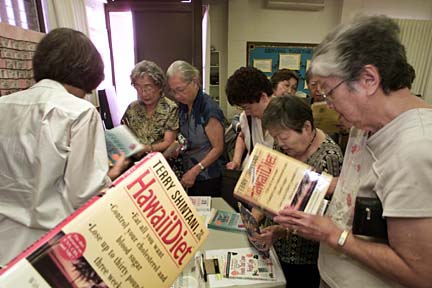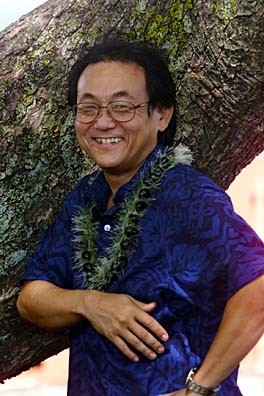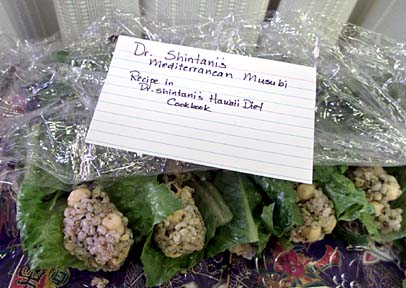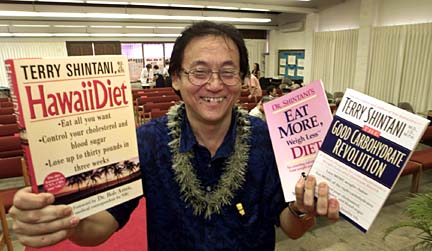

|
First Sunday Mark Coleman |
People who attended Terry Shintani's lecture on April 24 at Kailua Christian Church bought copies of his various books after he spoke.
Serving Up Shintani
Terry Shintani is a 1968 Punahou School graduate who originally thought he could "save the world" by becoming an attorney, but later learned he was more suited to pursuing that mission as a physician.
The legal profession presented "too many moral conflicts," he said, and he didn't like its "adversariality."
"I just want to help people," he said. "I don't want to fight."
It was while attending law school at the University of Hawaii that he stumbled across what would become his life's focus: nutrition and human health. Struggling in his classes and feeling tired a lot, he stopped eating junk foods and replaced them with mostly whole, unprocessed, plant-based foods. He was so impressed with the result, he said, that after obtaining his law degree, he entered medical school, also at UH, then attended Harvard University to obtain a master's degree in nutrition.
Returning to Hawaii, Shintani joined the staff of the Waianae Coast Comprehensive Health Center, where he works to improve the health of Hawaiians. He also is on the clinical faculty of the UH medical school and the Cancer Research Center of Hawaii. He has written a half-dozen books, including "Dr. Shintani's Hawaii Diet" and his latest, "The Good Carbohydrate Revolution."
A few years ago, then-Gov. Ben Cayetano and some of his staff tried the Shintani diet in an effort to lose weight and had great success. That led to national publicity and later to talk of starting a prison in Hawaii centered around the diet. In 2000, Zippy's launched a line of foods called Shintani Cuisine, royalties from which are donated to the Waianae center and Shintani's Hawaii Health Foundation, which he set up in 1996. The foundation sponsors free health presentations and diet programs and donates educational materials to any group that requests them.
Shintani may save the world yet.
After his recent talk at Kailua Christian Church, Terry Shintani relaxed outside.
I'm late, I'm late ...
Mark Coleman: I was told you'd be a little late today because you were working on a bill about native Hawaiian healers.Terry Shintani: Oh, that's one of my side things. I'm director of integrative medicine at the Waianae Coast Comprehensive Health Center, and it's one of our pioneering efforts where we put native healers in a community health center setting. But I was first an attorney, and I realized that we couldn't do that unless we had a law that allowed for the practice. I don't know when it happened, but Westerners' laws rendered native Hawaiian healing illegal, because you're practicing medicine without a license -- or at least it can be interpreted that way. Some people say, "Well, it's a constitutionally protected cultural practice," but that's one of the things I try to make clear -- that the government should stay out of it.
MC: So you want to have these people working with you at the Waianae center ...
TS: They are working with me. The law was passed two years ago. But we're just trying to tune it up and make it better.
MC: And what does the law say exactly?
TS: Fundamentally, it says that native Hawaiian healers, if they are recognized as such by a kupuna council, a council of elders, would be exempt from the law against practicing medicine without a license.
MC: So obviously you feel they contribute some value to the medical field.
TS: Lots of value. Especially in our community where we have so many native Hawaiians. My focus on that is, number one, I want the best health for the native Hawaiians, and number two, I want to preserve whatever native Hawaiian healing cultural arts that are left, and the only way you keep it alive is to actually do it.
MC: How did you get involved with the native Hawaiian community?
TS: Well, just before I came back from the mainland, I found out that native Hawaiians have just about the worst health in the nation and I thought, for a state that claims itself to be the health state, it's unacceptable. So, because my area's nutrition, and what's killing native Hawaiians is bad diet, I thought it was logical that I would apply my skills in the area where they have the most Hawaiians, and that's the Waianae Coast.
One attendee at Terry Shintani's Kailua lecture brought snacks. This "Mediterranean Musubi" was from his "Hawaii Diet" cookbook.
Back in the '80s ...
MC: When I first met you back in the '80s, you were taking over the clients of Dr. John McDougall.TS: Yes.
MC: How did you get to know Dr. McDougall, who was sort of another New Age diet guru, I guess.
TS: Well, don't call me a New Age diet guru. I'm hardly that.
MC: (Laughter) Well, he wasn't really one either.
TS: But in any case, the reason I got interested was years ago, when I was in law school, I changed my diet. I really tried to go from eating lots of junk food to eating whole, unprocessed, plant-based foods.
MC: Did you become a vegetarian?
TS: Yeah. And my health changed so much. I lost like 35 pounds, not even trying to lose weight. And I thought, "Why isn't anybody studying this?" Then I found out that the leading cause of death in America is bad diet. Heart disease kills a third of us. Cancer kills a quarter of us. Strokes kill 7 percent of us. Diabetes is rising; it kills 3 percent. Obesity is out of control. And it struck me that one of the greatest unfulfilled needs of health care was a doctor who knew something about nutrition. That's why after medical school I went to Harvard to get a master's in nutrition.
But, you know, your question was how did I get involved with McDougall. I had it in the back of my mind that we needed to use nutrition to effect changes in health, and I started looking at nutrition approaches -- including raw foods, macrobiotics -- and a person who was practicing that in a medical setting was John McDougall. So we became friends. Then when he decided to move to California, he turned his practice over to me.
Terry Shintani displayed a few of his books April 24, after giving a talk at Kailua Christian Church.
The system is broken
MC: It's always seemed obvious to me that science supports avoiding meat and junk foods as much as possible.TS: Yes, and for me, it was so puzzling why the modern medical system did not embrace nutrition as an intervention -- not just prevention, but intervention. There are reasons why insurance companies don't want to pay for prevention, because everybody needs it, so there are no odds in it. But I'm saying, "Well what about intervention? What if somebody is diabetic? What if somebody has hypertension? What if somebody has high cholesterol? Why aren't you paying for nutrition to deal with that the same way you pay for medications?"
MC: Well, if you're asking patients to change their diet, what's there to pay for?
TS: The counseling services -- a physician to guide them through that. But they'll only pay me as if I have only five minutes for the patients and I prescribe a pill. That's all they'll pay for.
MC: Do you think you could have helped Bruddah Iz? He was so seriously overweight.
TS: Yeah, I think that was a good example of the failure of the medical system. I actually went to his apartment once, and I took one look at him and I said, "I think he should be in the hospital," because he was on his oxygen, he was struggling to breathe. So I called his physician and said, "Could you tell me what his condition is?" Because, you know, I thought he needed a little better care. I didn't want to intervene, because I wasn't his doctor. But basically it turns out that the insurance system wouldn't pay for any more hospital visits except to stabilize him and then send him back out. The insurance company would not pay for my services or anyone else's to get him out of that situation. It could have been done, but it would have taken some resources.
Explaining obesity
MC: How does somebody get that overweight?TS: I think it's just a mismatch between genetic propensity and bad American diet. For centuries, various groups of people -- Polynesians and others -- went through periods of food deprivation, whether it was long journeys or periods of famine in the desert. They also were living with foods that were low in calorie density, or what I call high in mass index. But then, in the last 50 to 80 years, all of a sudden they're eating foods that are all refined, all sugar and all oil and fat, so it's easy to consume more calories than you really need, and some individuals become very large. Now, some people will say it's all in the genes. But if you look at Hawaiians in ancient times, you didn't see any obesity.
MC: You're not advocating specifically a vegetarian diet, are you? You have some fish and poultry recipes in your books.
TS: Well, for me, I think being a vegetarian is the best way to go, but realistically I don't expect everyone to do that. And culturally, most cultures did not. But the point is, even in those cultures you couldn't eat animal products all the time because you had no refrigeration.
Making no excuses
MC: You've had a good run with some of your books and your programs, including your Shintani Cuisine being sold through Zippy's.TS: Yes, in a lot of ways, that's done more good for the community than a lot of big organizations, because how many health-related organizations can document that they've actually induced several hundred thousand low-cholesterol, low-fat meals to be eaten? We actually did a little study: You know that "Super Size Me?" -- the guy who filmed himself eating McDonald's three times a day? You've heard of that?
MC: No, I haven't.
TS: This journalist came out with this documentary where he ate McDonald's three times a day, and people could see before their eyes his health deteriorate. His pressure went up, his cholesterol went up, he gained 25 pounds in one month. And McDonald's' response was, "Well, this is more about personal choice." And my response to that is, "Well, I don't have to make excuses for Shintani Cuisine at Zippy's." We put 20 people on a diet where they ate only Shintani Cuisine food for 21 days, and everybody lost weight, everybody's cholesterol went down.
MC: But you don't favor suing, like how they went after tobacco, and now people are trying to sue McDonald's. Isn't that kind of ridiculous?
TS: No. I don't think that's ridiculous. I think that somehow people have to come to the realization that bad food creates bad health.
MC: Like you say, the guy said "personal choice."
TS: That's McDonald's' view. To me it's not just a matter of personal choice.
MC: So you think they should be liable for selling foods that are not healthy?
TS: I think they need to allow that to proceed and see what comes out, the same way they did with tobacco.
MC: Did you think the outcome for the tobacco industry was just?
TS: Sure, absolutely.
MC: Even after all the decades of people being warned that smoking is dangerous and they still do it?
TS: Well, if you've got billions of dollars in advertising money, you can really influence people to do things that are not good for them.
MC: If you go down that road, then aren't you're saying, well, they shouldn't be allowed to advertise, or they shouldn't be allowed to sell food. Or what?
TS: No. All I'm saying is people have to be more responsible in their advertising and what they promote. And government needs to be more responsible as to what they allow.
MC: You think it's the government's role to "allow" something?
TS: Well, let's look at it globally, OK? An average person who doesn't have a lot of money and who drives by a fast-food place and sees a 99-cent giant burger with a giant soda will find that hard to resist. Now, do you know how they got the price down to be 99 cents? Your money and my money went into farm subsidies, to pay for cheap corn, to make cheap beef for that burger, and to make cheap corn to make high fructose corn syrup to make a cheap soda. Where's the responsibility there?
MC: Well I'm with you on that. That's another issue that needs to be looked at.
TS: Right. So, you're saying free choice, yes, but if the choice before you is spend a dollar on an apple, which is 80 calories, which is healthy, or a dollar for a burger and a drink, and you don't have much money, what are you going to choose? You're going to choose more calories. And then they throw on top of that hundreds of millions of dollars of advertising. Where's the hundreds of millions of dollars advertising the apple? That's why I'm saying that we have to look at it globally, not just, "Well, what about lawsuits?" or whatever. Let's look at the whole picture.
MC: I agree. It's very ecologically connected, like a web.
TS: Exactly. The other thing I'm trying to do is introduce legislation here so the insurance companies will value physicians who practice nutrition a little more highly.
MC: Which could be a model for the rest of the country?
TS: Right. Because I think the biggest problem is that in this country it is easy to value money more than people. And by that I mean, for example, we know that a good diet will reverse many of these diseases, but if I promote a diet that means less meat and less dairy, the dairy industry and the cattle industry are going to exert pressure to not let that happen, because there's money in it. So now money has become more important than health. Or if I say, let's promote nutrition in medicine, pharmaceutical companies are going to be against that.
MC: It seems some doctors, all they want to do is give you pills.
TS: That's because the insurance company rewards the doctor for seeing lots of patients, regardless of the quality of the visit. The easiest way to see a lot of patients is to say, "Oh, you have diabetes? Here's your diabetes pill. See ya!" Go on to the next one. "Oh, you have hypertension? Here's your hypertension pill. See you in a month." You know? But if I stop there and say, "Look, let's get rid of your diabetes, here's what you gotta do -- you gotta eat this, you gotta do that, you gotta stop doing that" -- I'm losing money! Because I could be going to the next guy and writing out another pill prescription.
So that's what's broken about the system, and I'm trying to figure out a way to fix that, and it's not easy.
See the Columnists section for some past articles.
Mark Coleman's conversations with people who have had an impact on our community appear on the first Sunday of every month. If you have a comment or suggestion, please send it to mcoleman@starbulletin.com.



